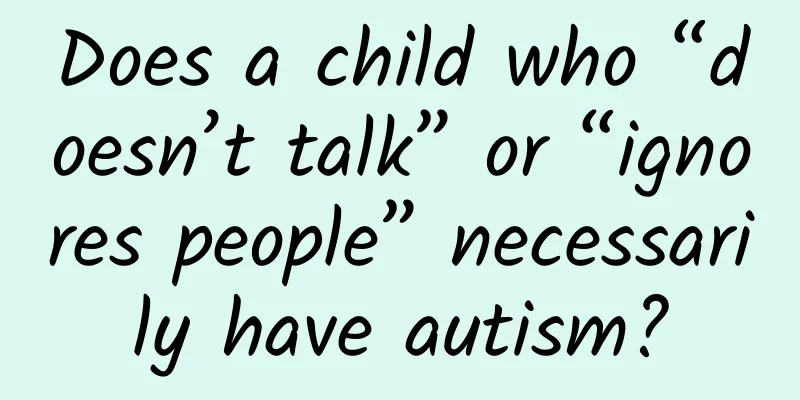Does a child who “doesn’t talk” or “ignores people” necessarily have autism?

|
Author: Yang Feng, deputy chief physician of Shenzhen Second People's Hospital Reviewer: Jing Jin, Professor and Chief Physician, School of Public Health, Sun Yat-sen University In the daily work of the language disorder specialist clinic, there are often some children diagnosed with "autism spectrum disorder" who come for treatment. However, through detailed observation of the children and playing interactive games with them, we found that although some children have obvious language barriers, they have good emotional interactions with their families and their non-verbal social communication skills are basically normal. Therefore, we believe that these children should not be diagnosed with autism. Copyright images are not authorized for reproduction So why do these children give people the impression of autism? In the diagnostic criteria for autism in the Diagnostic and Statistical Manual of Mental Disorders (5th Edition) (DSM-5), children who meet two core criteria at the same time can be diagnosed with autism: ① significant social communication or social interaction disorders; ② limited, repetitive abnormal behaviors and special narrow interests. However, these two "standards" in life can be affected by many environmental factors and show very different manifestations. For example, children who overuse electronic products for a long time (3 hours or more a day) are more likely to lack social skills with others, and show abnormal behaviors such as low social desire, poor emotional stability, and hyperactivity. For example, Children with obvious cognitive delays in development often only play monotonous and boring games because they do not understand the concept of objects and their functions, and can easily be mistaken for "stereotyped or repetitive" behavior. In addition, there are a small number of children whose language output ability is higher than their actual comprehension ability (they can only mechanically imitate certain words or sentences but do not really understand their meaning). They are prone to "misuse of language contexts", which looks like "talking to themselves" or "parroting" and is classified as abnormal behavior. However, this behavior is actually a pragmatic problem in language disorders. These behaviors need to be distinguished from the characteristic behaviors of autism. So, does a child who has no (little) language and does not (little) respond to others necessarily have autism? The answer is that many cases may not be diagnosed, because during the diagnosis and treatment process, if the doctor (assessor) uses language that exceeds his (her) understanding ability when interacting with the child, the child will often not speak or respond to others. This may actually be due to the child's insufficient language comprehension ability. Therefore, the diagnosis is more likely to be language development disability or global developmental delay. It should be pointed out that the diagnosis of autism in clinical practice should be very rigorous. If a child "does not speak or respond" during the medical consultation (evaluation), it should be considered that it may be a language development disorder or global developmental delay. The child's low language comprehension ability limits the child's understanding and response to instructions. Autism cannot be diagnosed on this basis, because the label of "autism" will bring heavy mental pressure and huge mental burden to the family, and even cause more serious consequences. The diagnosis of autism should strictly follow the diagnostic criteria of professional guidelines such as DSM-5: ① persistent communication deficits in social communication and social interaction in multiple settings; ② restricted, repetitive behavior patterns, interests or activities; ③ symptoms must exist in early development and these symptoms lead to impairment of social, occupational or other important social functions; ④ these symptoms cannot be better explained by intellectual disability (mental developmental disorder) or global developmental delay, etc. If autism is to be diagnosed, we recommend at least a period of observation, observing and evaluating the child's performance in different scenarios, interaction objects and different emotional states, in order to give a clearer diagnosis. |
<<: Business Insider: Social Media Statistics for 2013
>>: Trend Micro: Android malware is expected to reach 130,000 in Q4 2012
Recommend
Signs of low emotional intelligence in girls
Compared with boys, girls generally have slightly...
Can ultrasound really detect ectopic pregnancy?
Recently, many female friends have experienced ec...
157 standard weight for girls
Both girls and boys are more concerned about thei...
How long will the pain last?
Medical abortion is more effective for pregnancie...
What should be paid attention to in case of miscarriage
With the development of the times, many young peo...
Are breast augmentation implants effective?
Having a curvy figure is every woman's dream,...
What to do if breast pain and menstruation is delayed
Menstruation is something that female friends wil...
Can a vegetarian be a muscular man?
Recently, I have been paying attention to the iss...
How long should cactus be applied to treat breast lumps?
Mastitis, as a gynecological disease, occurs freq...
Can I do moxibustion during my aunt's period?
Moxibustion is an essential health-preserving too...
Which side is better to sleep when pregnant?
When pregnant, women are in a lot of pain. Due to...
What does high progesterone during menstruation mean?
Progesterone is a type of sex hormone. Under norm...
[Medical Q&A] Is astigmatism hereditary?
Author: Wang Mengyu: The Sixth People's Hospi...
Why does the engine light come on after filling up the car?
Whether you drive a car or a truck, you need to r...
What are the symptoms of corpus luteum insufficiency?
The corpus luteum refers to progesterone, which i...









